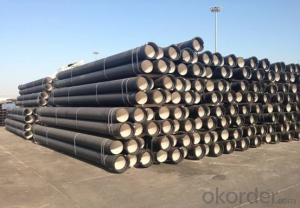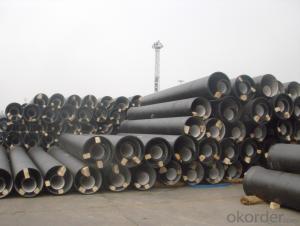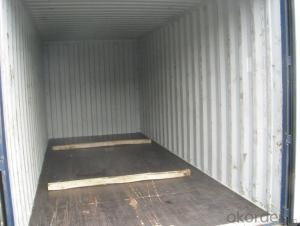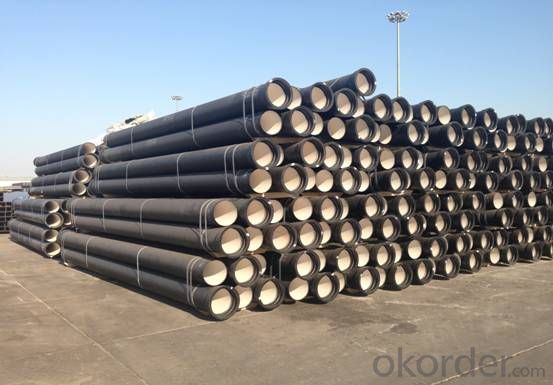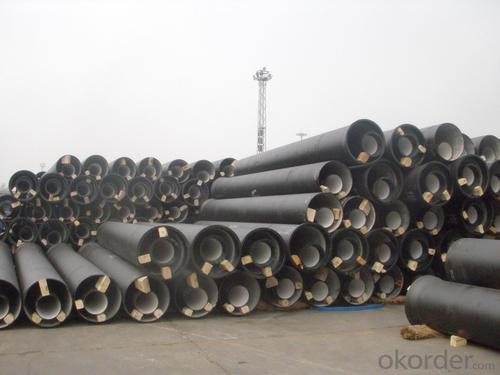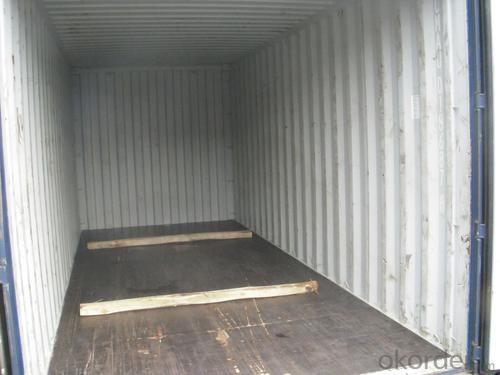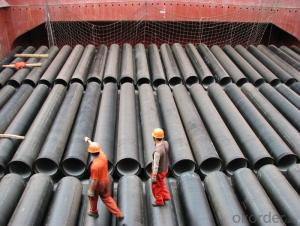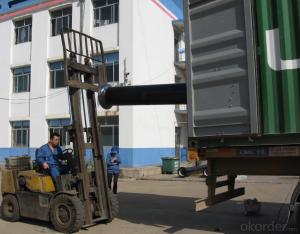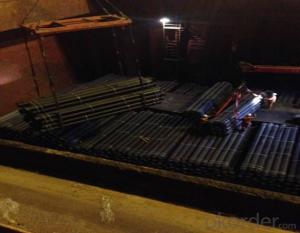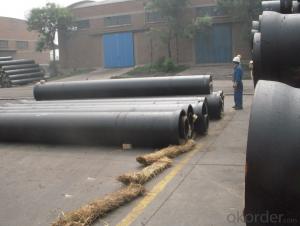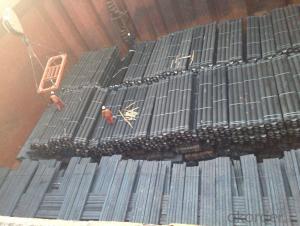DUCTILE IRON PIPES K8 DN125
- Loading Port:
- China Main Port
- Payment Terms:
- TT OR LC
- Min Order Qty:
- -
- Supply Capability:
- -
OKorder Service Pledge
OKorder Financial Service
You Might Also Like
Ductile Iron Cast Pipe is without any defects compare with tradition casting tech, which has many advantages particularly as follow:
(1) High density. In the "vertical upward casting" process, the melt iron of centre liquid column in center crystallizer is continuously feeding for volume shrinkage caused by condensation tube at outer circumference , which lead to be free of shrinkage porosity.
(2) High purity. When melt iron pouring, the mixed impurities such as gas, dross, sand grain which are lighter than melt iron could be eliminated at furnace mouth, its impossible to enter into the crystallizer through the channel, so the melt iron into the crystallizer is very pure.
(3) Strength with toughness. The cooling speed provided by continuous crystallizer is 30 times than sand casting and 5 times than centrifugal casting, and doesn't produce white iron, the eutectic cell volume of continuous cast iron is one eighth to one tenth compare with traditional cast iron. The density of graphite nodule in ductile iron can reach 300-700 pcs/mm2. Therefore, all reason above improve the strength and toughness of continuous cast iron.
(4) Free machining. The high speed cooling make the hardening phase (such as boride, steadite) not appear like reticular, massive or thick, but diffuse like fish bone and pane in shape, moreover, there are tiny graphite flakes inlaid hardening phase. It's free machining in BrinellHardness the range of 250-300HB. However, the Brinell Hardness of 250 is top limit to common metal materials.
(5) Uniform composition of tube wall. The convection mixing of liquid column caused by marching type drawing in crystallizer make the composition of tube wall well-distributed, and concentration gradient very little.
(6) High productivity. To the wall thickness of tube under 10mm, the speed of continuous casting is 1 meter/min, to the wall thickness of tube under 20mm, the speed of continuous casting is 0.5 meter/min, which is high efficiency that centrifugal or other casting tech couldn't reach.
- Q: How do ductile iron pipes perform in high-temperature water applications?
- Ductile iron pipes possess remarkable strength, durability, and exceptional mechanical properties, rendering them suitable for diverse applications. However, certain factors must be taken into consideration when utilizing them in high-temperature water scenarios. Typically, ductile iron pipes exhibit satisfactory performance in high-temperature water settings up to a specific threshold. The exact temperature constraint hinges on the particular grade of ductile iron employed and the duration of exposure to elevated temperatures. Generally, ductile iron pipes can endure temperatures ranging from 350 to 400 degrees Fahrenheit for brief periods without suffering significant deterioration or loss of strength. Nevertheless, it is crucial to acknowledge that prolonged exposure to high temperatures can have adverse effects on ductile iron pipes. When subjected to elevated temperatures, these pipes may undergo thermal degradation, which can result in diminished mechanical properties, heightened brittleness, and even eventual cracking or failure. To mitigate the risks associated with high-temperature water applications, several precautionary measures can be implemented. Firstly, selecting a suitable grade of ductile iron with an elevated temperature tolerance can enhance the pipes' performance. Secondly, incorporating adequate insulation or heat shielding measures can minimize direct heat transfer to the pipes, thereby reducing the likelihood of thermal degradation. Furthermore, frequent monitoring and maintenance of ductile iron pipes utilized in high-temperature water settings are crucial to promptly identify any indications of degradation or damage and take appropriate remedial actions to prevent failure. In conclusion, although ductile iron pipes typically perform well in high-temperature water applications, it is imperative to thoroughly evaluate the specific conditions and requirements of the application to ensure their sustained performance and integrity.
- Q: Can ductile iron pipes be used for underground irrigation systems?
- Indeed, underground irrigation systems can utilize ductile iron pipes. These pipes find extensive use in a multitude of applications, such as water supply and distribution systems. Renowned for their robustness, durability, and resistance to corrosion, ductile iron pipes prove ideal for subterranean installations. Moreover, they possess exceptional pressure-bearing capabilities, enabling them to endure the elevated pressures commonly associated with irrigation systems. Nevertheless, it remains crucial to guarantee appropriate installation and maintenance to avert any potential harm or leakage within the system.
- Q: Qianwei County ductile iron pipe which tool to use cutting convenience?
- Cutting method for cutting ductile iron pipes, in order to obtain neat kerf, we should start with a direction of play saw saw to end. If the requirement of the section is not high, the direction of sawing can be changed gradually to reduce the resistance and facilitate cutting in.
- Q: What is the difference between ductile iron and cast iron pipes?
- The main difference between ductile iron and cast iron pipes lies in their composition and properties. Ductile iron pipes are made from an alloy of iron, carbon, and silicon, which makes them more flexible and resistant to cracking. On the other hand, cast iron pipes are made from a mixture of iron, carbon, and other elements, which provides them with a higher resistance to corrosion and pressure. In summary, ductile iron pipes are more flexible and durable, while cast iron pipes are more resistant to corrosion and pressure.
- Q: Are ductile iron pipes suitable for use in hydropower projects?
- Indeed, ductile iron pipes prove to be a suitable option for implementation in hydropower projects. Possessing a remarkable tensile strength and corrosion resistance, these pipes emerge as the ideal choice for applications in hydropower projects where water flow and pressure play a significant role. Demonstrating the ability to endure high pressure and boasting durability, these pipes guarantee long-term reliability and safety within hydropower systems. Furthermore, when compared to alternative materials such as steel, ductile iron pipes present a cost-effective solution, rendering them a favored selection for hydropower projects. In summary, ductile iron pipes possess the essential characteristics and performance qualities necessary to meet the rigorous conditions encountered in hydropower projects.
- Q: How does ductile iron pipe compare to PVC pipe in terms of performance and cost?
- Ductile iron pipe and PVC pipe have different characteristics in terms of performance and cost. Ductile iron pipe is known for its strength, durability, and ability to withstand high pressure and heavy loads, making it ideal for applications that require robust performance such as water distribution systems. On the other hand, PVC pipe is lightweight, corrosion-resistant, and more flexible, making it suitable for above-ground and non-pressurized applications like drainage systems. In terms of cost, PVC pipe is generally less expensive than ductile iron pipe, especially for smaller diameter pipes. However, as the diameter increases, ductile iron pipe becomes more cost-effective due to its superior strength and longer lifespan, which reduces maintenance and replacement costs over time. Ultimately, the choice between ductile iron and PVC pipe depends on the specific application, budget, and desired performance characteristics.
- Q: Can ductile iron pipes be used in areas with high soil erosion?
- Yes, ductile iron pipes can be used in areas with high soil erosion. Ductile iron is known for its high tensile strength and durability, making it resistant to external forces such as soil erosion. It is a suitable choice for underground piping systems in such areas, providing long-term reliability and stability.
- Q: Can ductile iron pipe be recycled?
- Indeed, the recycling of ductile iron pipe is possible. Ductile iron, a variant of iron often employed in pipe production owing to its remarkable robustness and endurance, can be melted down when it reaches the conclusion of its productive lifespan. By utilizing the resultant molten iron, fresh items can be fashioned. This method of recycling not only aids in the preservation of precious natural resources but also lessens the necessity for raw materials and energy-intensive procedures utilized in the fabrication of novel pipes. Furthermore, the recycling of ductile iron pipe serves to diminish waste and contributes to a more sustainable and ecologically conscious approach to the advancement of infrastructure.
- Q: How much is the manual installation fee of ductile iron pipes from 100 to 150 per metre?
- According to the various connection modes after the installation of artificial fee at =8.7~9.0 yuan (about /M this is pure artificial installation fee, no other costs to calculate, if packet labor costs and construction should be appropriately increased when installed).
- Q: Are ductile iron pipes compatible with other pipe materials?
- Yes, ductile iron pipes are generally compatible with other pipe materials. Ductile iron pipes have a high level of flexibility and strength, making them suitable for connecting with different pipe materials such as PVC, HDPE, and steel. Transition fittings are commonly used to connect ductile iron pipes to other materials, ensuring a secure and leak-free joint. It is important to adhere to industry standards and guidelines when connecting different pipe materials to ensure compatibility and maintain the integrity of the pipeline system.
Send your message to us
DUCTILE IRON PIPES K8 DN125
- Loading Port:
- China Main Port
- Payment Terms:
- TT OR LC
- Min Order Qty:
- -
- Supply Capability:
- -
OKorder Service Pledge
OKorder Financial Service
Similar products
Hot products
Hot Searches
Related keywords
